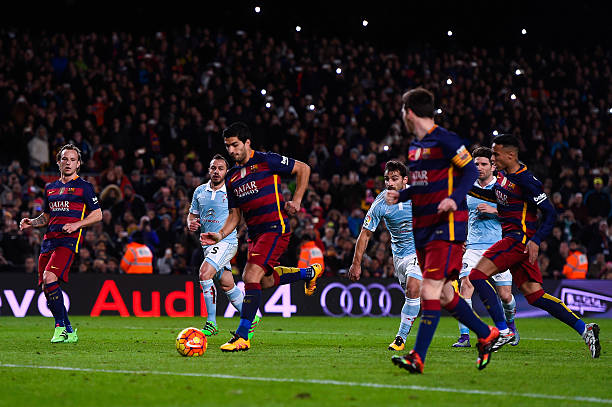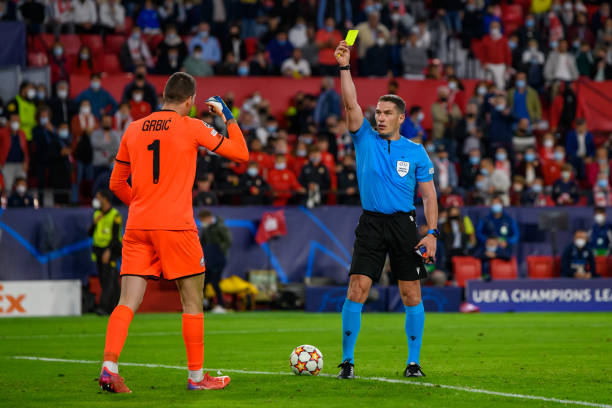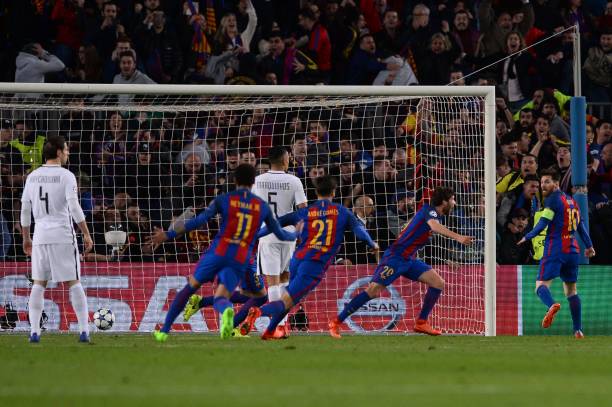Almost everyone has played football in their lives. Whether at home, on the street, at parks, in school, or even at stadiums. And most will believe that they know all the rules of football.
Pretty much everyone knows about the basic rules like offside, keepers picking up the ball from a back pass, fouls, free kicks, and penalties.
But there are so many rules that we never knew existed. Even professional footballers can sometimes forget about these “unknown” rules.
In this article, TOP SOCCER BLOG presents you with 10 football rules that you (probably) never knew existed.
1. Players can pass from a penalty

We are used to seeing penalty-kick takers shooting the ball directly into the net, but players can actually decide to provide assists from a penalty.
This can be done by simply passing the ball directly from the penalty spot to a nearby teammate.
In 2016, during a match between Barcelona and Celta Vigo, Barca were awarded a penalty, and Lionel Messi stepped up to take it.
Converting the penalty will have been his 300th La Liga goal, but he instead passed the ball to Luis Suarez, who was lurking nearby, to score.
Suarez had already scored two goals and Messi’s “penalty-assist” enabled the Uruguayan to complete his hat-trick.
However, things can equally go horribly wrong as it did when Thierry Henry and Robert Pires failed with the move against Manchester City in 2005.
2. A penalty-taker cannot score from a rebound if the ball directly hits the post
We all know that a player cannot touch the ball twice during a penalty. He can only hit the ball once.
But there is a weird part of the rule, which is that:
During a penalty, the penalty kick taker cannot touch the ball to score after the ball had DIRECTLY hit the post and rebounded — unless it has been touched by another player.
The ball must either be touched by the goalkeeper or another player. Only then can the penalty taker attempt to score on the rebound.
For instance, when a player takes a penalty and the ball hits the post and bounces back to his feet. If he slots in the rebound, the goal will be cancelled.
But if, after taking a penalty, the goalkeeper touches the ball onto the post, and the ball bounces back to the taker’s feet, he can score from the rebound.
This is simply because the ‘keeper had touched the ball after the kick.
3. Goalkeepers cannot hold onto the ball for more than 6 seconds

When a goalkeeper collects the ball in his hand (whether from a shot, cross, or any other means), he has to release the ball in some way after 6 seconds to show that he is not holding it.
Most’ keepers merely bounce the ball on the ground without having to pass or get rid of it.
Some even do so after 6 seconds, which is illegal. But this rule doesn’t strictly get enforced.
In case a keeper does hold the ball for a long time (whether bouncing it or not), and the referee notices it; an indirect free kick would be awarded, and the goalkeeper is shown a yellow card.
4. A goalkeeper cannot pick the ball up again after releasing it
If a keeper has the ball in his possession and releases it, he cannot pick it up again until another player has touched it.
If he does, an indirect free kick is awarded to the opposing team.
In cases of mistakenly dropping the ball, ‘keepers normally kick the ball away, pass it to a teammate or dribble the opposition player(s)!
5. A goal kick doesn’t have to leave the 18-yard box to be in play
In the past, during a goal kick, the ball had to leave the 18-yard box to be in play.
Under the old rule, if a player intercepts a goalie during a goal kick and scores, the goal would be disallowed because the ball didn’t leave the 18-yard box.
Furthermore, the player can even get booked.
But in recent times, during a goal kick, the ball doesn’t have to leave the 18-yard box to be in play. The ball is in play once the goalie releases it.
This new rule perfectly suits teams that like to build play from the back.
But it can also help forwards if the ‘keeper mistakenly kicks the ball and it doesn’t leave the 18-yard box. Attackers can run in and shoot the ball into the net.
This was perfectly illustrated at the ongoing 2022 FIFA World Cup in the group stage match between Portugal and Ghana.
In the last minutes of the game, the Portuguese goalkeeper was unaware that Ghanaian forward, Inaki Williams, was lurking behind him — and he dropped the ball.
Williams quickly rushed at the ball and caught the ‘keeper unaware’.
He, unfortunately, slipped at the most crucial moment — twice!
It would have been one of the most ridiculous goals scored in World Cup history.
6. A match cannot be played without corner flags
A football match cannot go ahead when there are no corner flags on the pitch.
The 1974 FIFA World Cup final between Germany and Holland was delayed by the game’s English referee, Jack Taylor because there were no corner flags!
The ground staff had actually forgotten to put the corner flags out on the pitch. They had earlier removed the flags to accommodate the closing ceremony, which took place before the final.
Only when the corner flags were put in their rightful places did the game started.
7. Players cannot score an own goal from a direct free-kick or throw-in
If a player directly passes a free-kick or throw-in back to his own goalkeeper and the ball somehow ends up in the net, it won’t be counted as an own goal.
Rather, a corner kick will be awarded to the opposing team.
But that is as long as no other player — except the free kick or throw-in taker — has touched the ball.
8. A player can get sent off even before a match starts
To regulate pre-match or tunnel bust-ups, referees are allowed to send players off even before the match kicks off.
In 2017, Patrice Evra was shown a red card prior to Marseille’s Europa League clash with Vitoria Guimaraes after angrily kicking a fan.
The former Manchester United defender was caught up in an ugly confrontation between Marseille players and Guimaraes fans before the match in Portugal.
During the warm-up, the Marseille players approached the side of the stadium containing opposition fans.
The fans started hurling insults at them, and in a bizarre moment of madness, Evra launched a kick at a fan!
He was given a straight red card which immediately ruled him out of the match.
Moreso, Evra was not even in Marseille’s starting eleven, but among the substitutes!
9. A match will be abandoned after 5 red cards
The maximum number of red cards that can be awarded in a football match is 4.
This is because there must be a minimum of 7 players in each team on the pitch for a match to start or continue.
Thus, a maximum of 4 ON-FIELD PLAYERS of a particular team can be sent off in a single match.
A 5th red card would bring the match to an end because one team would be short of the required number of players on the pitch.
10. Celebrations can still be penalised even if a goal is ruled out
Players can be penalised for a goal celebration even if the actual goal had been ruled out.
For instance, if a player scores an offside goal and celebrates by removing his shirt, then the goal get cancelled. He will still be booked for the shirt removal.
This could frequently happen nowadays with the availability of the Video Assistant Referee (VAR).
A good example was what happened in the between Juventus and Salernitana in September 2022.
With the scores level at 2-2, Arkadiusz Milik glanced a header home in second-half stoppage time and did a wild celebrations, removing his jersey.
Although, Milik thought he had earned Juventus a last-gasp win against Salernitana and was sent off for his celebration – only for VAR to rule the goal out.
YOU JUST HAVE TO ALSO FIND OUT:







